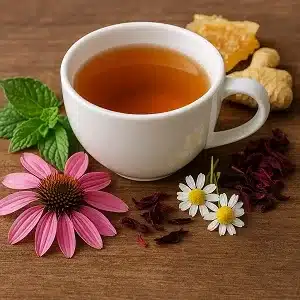When cold and flu season arrives, it’s natural to look for ways to strengthen your body’s defenses. While healthy habits like balanced nutrition, regular sleep, and proper hydration all play a role, herbal teas can also provide extra support. Packed with antioxidants, vitamins, and soothing properties, herbal teas are a time-honored way to nurture the immune system and bring comfort when you need it most.
Echinacea Tea
One of the most popular immune-supporting herbs, echinacea has been used for centuries to help the body fight seasonal challenges. Studies suggest echinacea may support the immune system by increasing white blood cell activity, which helps defend against invaders. Echinacea tea has a slightly floral, earthy taste and is best enjoyed at the first signs of seasonal stress.
Ginger Tea
Warming and spicy, ginger tea does more than soothe digestion. Ginger contains natural compounds like gingerol that have antioxidant and anti-inflammatory effects. It can help warm the body, ease congestion, and support circulation—all of which make it a comforting choice during colder months. Pair it with lemon and honey for a time-tested home remedy.
Turmeric Tea
Turmeric has long been celebrated for its anti-inflammatory power, thanks to the compound curcumin. Turmeric tea helps calm inflammation in the body and supports overall immune function. When combined with black pepper (which boosts curcumin absorption) or ginger, it creates a golden-hued blend that’s both delicious and health-promoting.
Hibiscus Tea
Vibrant and tangy, hibiscus tea is rich in vitamin C and antioxidants. These nutrients are essential for keeping the immune system strong and fighting oxidative stress. Its refreshing cranberry-like flavor makes it a great tea to enjoy hot or iced, and its natural tartness pairs well with a touch of honey for added soothing benefits.
Green Tea
While not technically an herbal tea, green tea deserves a place on this list because of its powerful immune-supporting properties. It contains catechins—antioxidant compounds that may help protect cells and boost immune response. The mild caffeine in green tea can also provide a gentle energy lift, making it a smart choice for daytime support.
Chamomile Tea
Chamomile is often thought of as a bedtime tea, but its benefits go beyond relaxation. With natural antibacterial properties and a high antioxidant content, chamomile tea can help the body fight off seasonal irritations. Its calming effects also promote better sleep, which is one of the most important factors for keeping the immune system resilient.
Peppermint Tea
Refreshing and cooling, peppermint tea can be especially soothing when you’re feeling under the weather. Its natural menthol compounds help open airways, ease breathing, and calm an irritated throat. At the same time, peppermint contains antioxidants that support immune health, making it both comforting and functional.
Building an Immune-Boosting Tea Routine
The beauty of herbal teas is that you can enjoy them in combination, creating blends that suit your taste and wellness needs. For example, try ginger and lemon in the morning for an energizing start, chamomile in the evening for rest, and hibiscus during the day for a vitamin C boost. Drinking herbal teas regularly keeps you hydrated while delivering natural compounds that promote wellness.
The Bottom Line
Herbal teas have been trusted for centuries to support immunity and bring comfort during cold and flu season. From echinacea and ginger to hibiscus and chamomile, each blend brings its own unique benefits. Making them part of your daily routine can help keep your body strong and provide soothing relief when you need it most.
So the next time the weather turns chilly or you want a natural way to stay resilient, reach for a warm, calming cup of herbal tea, it’s one of the simplest and most enjoyable ways to support your health.

